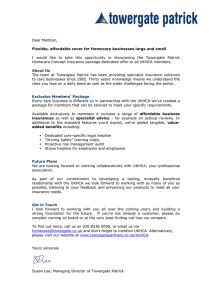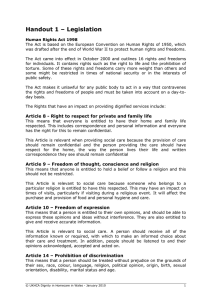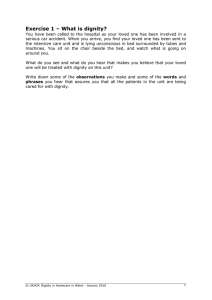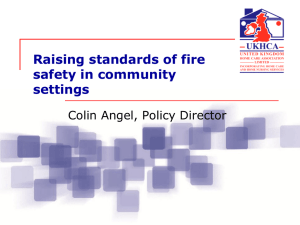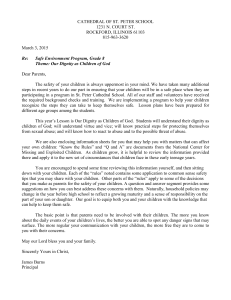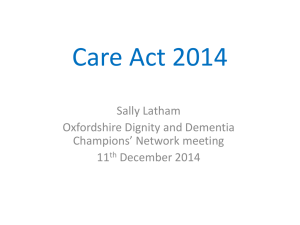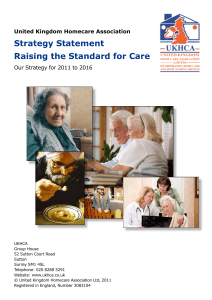Learning outcomes
advertisement
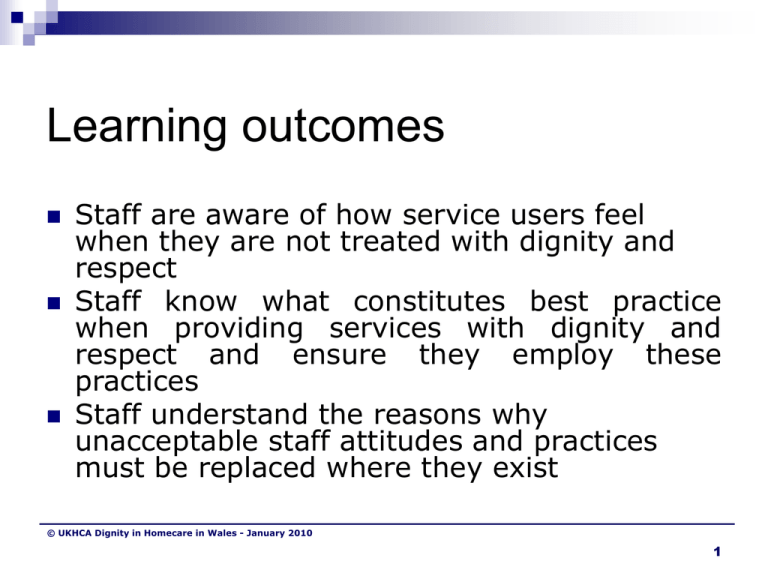
Learning outcomes Staff are aware of how service users feel when they are not treated with dignity and respect Staff know what constitutes best practice when providing services with dignity and respect and ensure they employ these practices Staff understand the reasons why unacceptable staff attitudes and practices must be replaced where they exist © UKHCA Dignity in Homecare in Wales - January 2010 1 Definitions of dignity (1) Putting the person receiving care at the centre of things Asking what their specific wants and needs are Giving information Being addressed in an appropriate manner Being patient Not patronising the person receiving care Helping people feel they are in a safe environment Making sure people are not left in pain © UKHCA Dignity in Homecare in Wales - January 2010 2 Definitions of dignity (2) Ensuring people do not feel isolated or alone Giving people privacy Encouraging people to help themselves as much as possible Taking into account people’s cultural and religious needs, not discriminating against them Treating people with respect Listening to people Responding to the person as soon as requested Maintaining confidentiality at all times © UKHCA Dignity in Homecare in Wales - January 2010 3 © UKHCA Dignity in Homecare in Wales - January 2010 4 Barriers to providing dignified care 1. Environment 2. Staff attitudes and behaviour 3. Culture of care 4. Specific care activities © UKHCA Dignity in Homecare in Wales - January 2010 5 Why change? Human rights and other discriminatory legislation National minimum standards and regulations Regulatory inspections Contract terms Others waiting to whistle blow on you It could cost you your job © UKHCA Dignity in Homecare in Wales - January 2010 6 © UKHCA Dignity in Homecare in Wales - January 2010 7 Empathy If you were receiving domiciliary care, what would the care worker do or say to make you feel you were receiving a dignified service. Use words, phrases or sentences to describe the service. © UKHCA Dignity in Homecare in Wales - January 2010 8 Best practice Communication Respect Privacy Autonomy Social inclusion Diversity and equality Pain control Eating and nutrition Personal hygiene Personal care Abuse Whistle blowing End of life care © UKHCA Dignity in Homecare in Wales - January 2010 9 Specific care needs Older people Physically disabled people People with specific health needs eg, cancer People with mental health problems eg, dementia People with learning difficulties Young, physically disabled people People from minority ethnic groups © UKHCA Dignity in Homecare in Wales - January 2010 10 Learning outcomes Staff are aware of how service users feel when they are not treated with dignity and respect Staff know what constitutes best practice when providing services with dignity and respect and ensure they employ these practices Staff understand the reasons why unacceptable staff attitudes and practices must be replaced where they exist © UKHCA Dignity in Homecare in Wales - January 2010 11 © UKHCA Dignity in Homecare in Wales - January 2010 12
